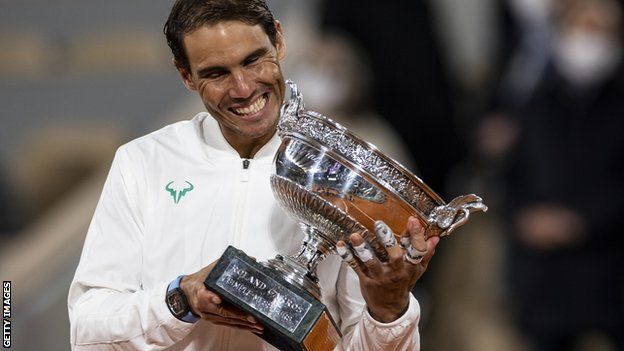French Open 2020: Why the tennis GOAT debate is about so much more than numbers
- Published

Rafael Nadal won his 13th French Open on Sunday
"I think our generation is now on the way out," Rafael Nadal said at the French Open of 2014.
"A generation is walking away, and others will replace us."
That remains to this day one of my favourite Nadal quotes. Laced with humility, even if it did not age as well as he has.
Nearly six and a half years later, and Nadal is not only a 13-time Roland Garros champion, but also a 20-time Grand Slam champion.
Sparkling in defence, and explosive in attack in Sunday's final against Novak Djokovic, Nadal produced a performance every bit the equal of his jaw dropping 6-1 6-3 6-0 win over Roger Federer in the 2008 final.
He now has the same number of Grand Slams as Federer, although both are still shy of Serena Williams' Open era record of 23.
The Swiss was quick to offer his congratulations, and "hopes 20 is just another step on the continuing journey for both of us".
Federer, now in his 40th year, has featured in just one of the past 10 Slam finals. Nadal has appeared in half of them, and given he was able to win Roland Garros without dropping a set (with just three matches under his belt since February), may one day be in Williams territory.
Not that Djokovic is remotely done. He is a year younger than Nadal, has been in six of the past 10 Slam finals, and is fuelled by the thought of ending his career with more Grand Slams than any other man.
Nadal always says you cannot go through life worrying about the fact your neighbour has a bigger house or a bigger boat (unlikely in his case), but is also open about his desire to retire on top of the pile.
Some will argue Nadal's success is inflated by his mastery of clay. True, 65% of his Grand Slams have come at Roland Garros, but think how injury has robbed him of further opportunities in Melbourne, Wimbledon and New York.
The debate about the greatest male player of all time has become increasingly partisan. We can all throw statistics at one another, but the attachment is more emotional. You may have found the rivalry between Federer and Nadal - each a perfect foil to the other - too compelling not to take sides.
But how about the achievements of the man, from a country with little tennis heritage, who broke up that duopoly? How about the 12-year-old boy who found a path out of Belgrade, having spent 78 consecutive nights sheltering from the Nato bombings?
There will, of course, never be a definitive answer (although you can cast your vote at the bottom of this page), so the number of Grand Slams won will carry a lot of weight. Weeks as world number one, Olympic gold medals and Davis Cup titles all count for a great deal, but if you want to boil this down to a numbers game, then the Grand Slams remain the sport's reference point.
There seemed only two plausible winners of this French Open, given Dominic Thiem was, in his own words, not running on a full tank after his US Open triumph.
But the betting market will become more crowded in the year ahead. Thiem has himself been in four of the past 10 Slam finals, and Stefanos Tsitsipas and Alexander Zverev look closer to completing their education in what it takes to win a Grand Slam.
And so to January's Australian Open in Melbourne. Djokovic's most successful Slam will be Federer's comeback Slam, and perhaps an event that owes Nadal a favour. The Spaniard has lost four finals and often struggled with injury there in recent years.
Nadal will decide on the remainder of this season's schedule with that tournament, and a likely two-week quarantine, very much in mind.
The clay may not yet be out of his racquet strings, but all roads are already pointing towards Melbourne.
If you are viewing this page on the BBC News app please click here, external to vote.